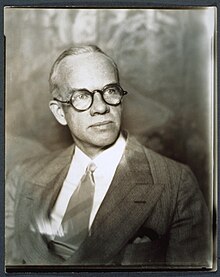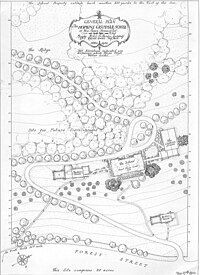| Henry Killam Murphy | |
|---|---|
 Murphy in 1928-9 Murphy in 1928-9 | |
| Born | (1877-08-19)19 August 1877 New Haven, Connecticut |
| Died | 12 October 1954(1954-10-12) (aged 77) Branford, Connecticut |
| Nationality | American |
| Alma mater | Yale University |
| Occupation | Architect |
| Projects | University of Shanghai; Tsinghua University, Beijing; Ginling College, Nanking; Yenching University, presently Peking University; Yale-in-China, Changsha; Rikkyo University, Tokyo; Yonsei University, Seoul |
Henry Killam Murphy (August 19, 1877 – October 12, 1954) was an American architect noted for his design of educational establishments in the North-East of the United States, China and Japan.
Early life and education
Henry Killam Murphy was born in 1877 in New Haven, Connecticut, to parents Alice Button Killam and John Murphy.
Murphy attended the Hopkins School, graduating in 1895. He then went on to study at Yale University graduating in 1899 with a Bachelor of Fine Arts degree. After a year spent at the Yale Graduate School preparing for a career as an architect, Murphy was first employed in this capacity in the New York City offices of Tracey and Startwout in 1900.
Murphy & Dana Architects
In 1906 Murphy opened his own firm with Yale University instructor, Richard Henry Dana Jr., a business partnership that lasted until 1921. Together they took on work such as designing the early Loomis Chaffee campus in 1912, and successfully earned commissions to design numerous private residential and college academic buildings in the North East of the United States, in China and in Japan. Examples of their architectural work still extant include the historic administration buildings, old library and college chapel of Rikkyo University in Tokyo.
After Dana left in 1921, the firm continued as Murphy, McGill & Hamlin until 1924 when Murphy established his own independent practice.
Noted architectural works

Murphy, both in partnership and independently, designed a wide range of buildings throughout his career, including several buildings in his home state of Connecticut. Murphy worked for his alma mater Hopkins School, designing the early campus in 1922 and center building Baldwin Hall in 1925.
During his career Murphy made eight trips to China, the first for a few weeks in 1914, the last and longest from 1931 to 1935. In 1919, he was in charge of designing the campus of University of Shanghai (now University of Shanghai for Science and Technology). In the early 1920s, Murphy designed several landmark buildings for Tsinghua University, Beijing, including The Grand Auditorium and the Main Library. He was an advocate of traditional Chinese architectural styles, adapted to modern uses.

Murphy attracted the attention of Chinese leader Chiang Kai-shek and was hired in 1928 to design a modern capital for China in the ancient city of Nanjing. One of his more notable proposals was to save the wall around the city as a concourse. Murphy designed other Chinese buildings such as the Memorial Hall for Revolutionary Martyrs on Purple Mountain over Nanjing. Chiang Kai-shek was not Murphy's only connection to China. Murphy also designed a small Chinese village of eight homes in Coral Gables, Florida, as well as the Chinese Nationality Room in the Cathedral of Learning
Murphy returned to the United States in 1935 and retired to a house he designed in Branford, Connecticut. He died at his home in 1954.
Family
Murphy was married four times, and had no children. His first marriage was in 1905 to Edna Mitchell Cook, who died in 1918. His second marriage in 1920 was to Ethel Andrews, from whom he was divorced in 1926. (She would remarry John Marshall Harlan II in 1928.) In 1930 Murphy married the art historian and collector of Eurasian bronzes Dagny Carter, author of China Magnificent, Five Thousand Years of Chinese Art (first published 1936). In 1949 he married his fourth wife, Rosalie Smith Exum, in North Carolina.
References
- Primary Sources for the Study of Art, Architecture, and Drama In Manuscripts and Archives from the Yale Library. Retrieved April 11, 2006.
- Descendants of Benjamin King from Rootsweb in August 2000.
- Tatum, Laura. "Guide to the Henry Killam Murphy Papers". Yale University Library. Yale University Library Manuscripts and Archives. Retrieved 18 December 2014.
- ^ "From Hopkins' Baldwin Hall to China's Memorial Hall" for Views on the Hill Spring/Summer '06 by Thom Peters.
- Derby Neck Library for New England Carnegies by Corinne H. Smith. Retrieved April 11, 2006.
- Crown Street, 305 for Yale Buildings and Ground. Retrieved April 11, 2006.
- Whitney Avenue, 175 for Yale Buildings and Ground. Retrieved April 11, 2006.
- Sightseeing Opportunities in Coral Gables for Pedestrian Guides. Retrieved April 11, 2006.
- Cody, Building in China, p.51 n5.
- "Milestones", Time magazine, 28 July 1930
- North Carolina Index to Marriages 1741-2004
Further reading
- Jeffrey W. CODY, Building in China: Henry K. Murphy's "Adaptive Architecture", 1914-1935, Hong Kong: The Chinese University Press; Seattle: University of Washington Press, 2001.